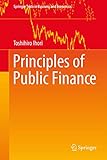Principles of public finance
By: Ihori, Toshihiro
Material type: BookSeries: Springer Texts in Business and Economics.Publisher: Singapore : Springer, 2017.Description: xxvii, 403 p. : col. ill. ; 24 cm.ISBN: 9789811023880Subject(s): Finance | Public FinanceDDC classification: 336 IH PR Online resources: More online. | More online. | More online. | Location Map
BookSeries: Springer Texts in Business and Economics.Publisher: Singapore : Springer, 2017.Description: xxvii, 403 p. : col. ill. ; 24 cm.ISBN: 9789811023880Subject(s): Finance | Public FinanceDDC classification: 336 IH PR Online resources: More online. | More online. | More online. | Location Map | Item type | Home library | Call number | Status | Date due | Barcode | Item holds |
|---|---|---|---|---|---|---|
| REGULAR | University of Wollongong in Dubai Main Collection | 336 IH PR (Browse shelf) | Available | T0058024 |
Chapter 1. Public Finance and a Review of Basic Concepts
1 The Main Functions of the Public Sector
2 A Review of Analytical Basic Concepts
3 The Public Sector in Japan
4 Organization of the Book
Appendix: Japan's Fiscal Management
References
Questions
Part I Macroeconomic Aspects of Public Finance
Chapter 2 The Macroeconomic Theory of Fiscal Policy I
1 The Simple Keynesian Model
2 The IS/LM Analysis
3 The Open Economy
4 The Efficacy of Fiscal Policy and the Policy Maker
Appendix: Public Investment in Japan
Keywords
Chapter 3 The Macroeconomic Theory of Fiscal Policy II
1 The Permanent Level of Fiscal Variables
2 Consumption and Saving Behavior
3 The Labor Market and Supply Function
4 Equilibrium in the Goods Market
5 The Effect of Fiscal Policy
6 Evaluation of the Public Sector
Appendix: The Size of Government Spending and the Private Sector's Evaluation
Chapter 4 Public Debt
1 Ricard's Neutrality Theorem
2 The Shift of the Burden to Future Generations
3 Barro's Neutrality
4 Policy Implications of the Debt Neutrality Theorem
5 The Non-Keynesian Effect
Appendix: Government Debt in a Overlapping Generations Model
Chapter 5 Economic Growth and Fiscal Policy
1 A Simple Growth Model
2 Optimal Public Investment
3 The Solow Model
4 The Endogenous Growth Model
5 Inequality and Economic Growth
Appendix A: Taxes on Capital Accumulation and Economic Growth
Appendix B: Supply-Side Effect of Public Investment in Japan
Chapter 6 Fiscal Management
1 Understanding Fiscal Management
2 Fiscal Bankruptcy
3 Fiscal Consolidation
Appendix: Fiscal Deficits in a Growing Economy
Chapter 7 The Public Pension
1 Justification of the Public Pension
2 Economic effect of the Public Pension
3 Public Debt and the Public Pension
4 Public Pension Reform
5 Privatization of the Pay-as-you-go System
Appendix A: Intergenerational Conflict in an Aging Japan
Appendix B: Simulation Analysis in an Aging Japan
Conclusion
Part II Microeconomic Aspects of Public Finance
Chapter 8 The Theory of Taxation
1 Taxation and Labor Supply
2 The Efficiency of Taxation
3 Interest Income Tax and Saving
4 Investment and Tax
5 Consumption Tax
Appendix: The Savings Elasticity Controversy
Chapter 9 Tax Reform
1 Labor Income Tax and Interest Income Tax
2 The Theory of Optimal Taxation
3 The Theory of Tax Reform
4 General Consumption Tax and Labor Income Tax
5 The Timing Effect of Taxation
6 Simulation Analysis of Tax Reform
Appendix A: Optimal Taxation in an Overlapping Generations Economy
Appendix B: Tax Reform within Lump Sum Taxes
Chapter 10 Income Redistribution
1 Progressive Income Tax
2 Endogenous Labor Supply
3 The Optimal Income Tax
4 Nonlinear Income Tax
5 Economic Constraint and Redistribution
Appendix: Optimal Linear Income Tax
Chapter 11 The Theory of Public Goods
1 Public Goods
2 Optimal Provision of Public Goods: The Samuelson Rule
3 The Theory of Public Good Provision: the Nash Equilibrium Approach
4 The Theoretical Analysis of Public Goods: the Lindahl Equilibrium
5 The Free Rider Problem
6 The Neutrality Theorem of Public Goods
Appendix: Public Bads, Growth, and Welfare
Chapter 12 Public Spending and the Political Process
1 The Failure of Government
2 The Voting Model
3 The Voting Model and Reality
4 Political Parties and Fiscal Policy
5 Theoretical Model of the Partisan Business Cycle
6 Further Comments
Appendix A: Fiscal Privileges, Consolidation Attempts and Pigouvian Taxes
Appendix B: Political Factors and Public Investment Policy in Japan
Chapter 13 Local Public Finance
1 Intergovernmental Finance
2 The Supply of Local Public Goods
3 Tax Competition
4 The Time Consistency of a Tax Policy
5 The Principle of Local Tax
6 Redistribution among Local Governments
7 Further Issues on Intergovernmental Finance
Appendix: Analytical Model of Central and Local Governments in Japan
Index. .
This textbook equips instructors and students with an overview of the existing literature so that the latter can attain an overall understanding of macroeconomic and microeconomic public finance. The literature on public finance has grown dramatically with theoretical studies and empirical analysis, and much of the focus has been on macroeconomic effects of public services. The standard textbook offerings, however, are mainly restricted to microeconomic topics of public finance. This text intends to fill this gap by presenting a theoretical-based, comprehensive explanation of public finance. Particular emphasis is directed at developing tools that can be applied theoretically and empirically to clarify essential economic concerns in the current public sector in advanced countries, including Japan. Such concerns include the macroeconomic effect of fiscal policy, the dependence on bonds for covering government deficits, and social security reform. The main text explains the standard concepts of public finance, and the appendix offers various advanced topics. The material will facilitate an understanding of how to investigate changes in the public sector, interpret results, and basically do research on fiscal policy. The textbook will be of value to a broad range of course offerings, including those generally focused on fiscal policy, on social security reform and on tax reform.
